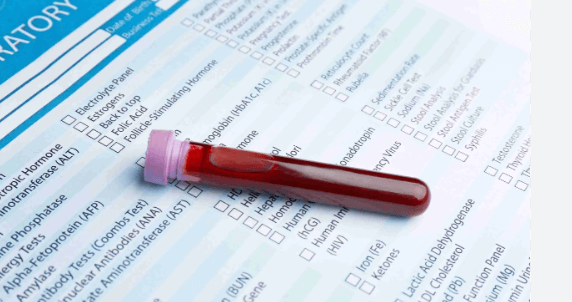Discover how long it really takes for your doctor to call with blood test results in the UK

Blood tests are a common diagnostic tool used by healthcare professionals to assess various aspects of a patient’s health. They can be used to detect infections, monitor chronic conditions, and evaluate organ function, among other things. However, one concern that many patients have is how long it will take for their doctor to call with the results.
In the UK, turnaround times for blood test results can vary depending on a variety of factors. While some results may be available within hours or days, others may take several weeks to come through. This article aims to provide an overview of the blood test process in the UK and what patients can expect when waiting for their results.
By understanding typical turnaround times and factors that may affect them, patients can better prepare themselves and manage their expectations while awaiting their results.
Understanding the Blood Test Process
The blood test process involves the collection and analysis of a sample to assess various biomarkers, providing valuable insight into an individual’s overall health status. Understanding test accuracy is crucial in interpreting abnormal results, as false positives or negatives can lead to unnecessary treatments or missed diagnoses.
Blood tests are generally reliable, but factors such as medication use, recent meals, and underlying medical conditions can affect their accuracy. It is important for patients to communicate any relevant information with their healthcare provider before undergoing a blood test to ensure accurate interpretation of results.
Additionally, understanding the normal range for each biomarker tested can help individuals interpret their own results and identify potential areas of concern that may require further evaluation by a healthcare professional.
Typical Turnaround Times for Blood Test Results
Typically, the waiting period for receiving blood test results can feel like an eternity, as the process of analyzing and interpreting data with accuracy demands considerable time. However, there are average wait times that patients can expect depending on the type of test and laboratory workload.
For instance, routine blood tests may take anywhere from 24 hours to several days to produce results while more complex tests such as genetic analysis or cancer screenings may take up to several weeks or even months. Additionally, interpreting results is a crucial aspect in determining whether further testing or medical intervention is needed.
It is important to note that doctors prioritize urgent cases and will notify patients promptly if their results require immediate attention. In conclusion, while waiting for blood test results can be anxiety-inducing, understanding typical turnaround times and trusting your doctor’s judgment can help alleviate any concerns during this period of uncertainty.
Factors that May Affect Turnaround Times
There are several factors that can impact the turnaround time for blood test results.
Firstly, the doctor’s workload may affect how quickly they are able to review and communicate the results to their patients.
Additionally, laboratory processing times can vary depending on the volume of tests being conducted and the complexity of each individual test.
Lastly, different types of tests may have varying turnaround times based on their method of analysis and level of specialization required.
It is important to understand these factors in order to manage expectations regarding when blood test results will be available for review.
Doctor’s Workload
Assessing the workload of doctors may provide insight into the time frame for receiving blood test results in the UK. It is important to note that doctors are often inundated with numerous patients, each requiring attention and care. This can result in longer turnaround times for blood test results as doctors must prioritize their workload accordingly. The table below provides a breakdown of doctor’s availability and patient communication within NHS England. As shown, there are only 0.8 full-time equivalent (FTE) GPs per 1000 patients, indicating a high demand for their services. Additionally, patient communication channels such as email and telephone consultations have increased significantly over the past few years, suggesting that doctors are being pulled in multiple directions at once. Thus, it is reasonable to assume that doctor’s workload plays a significant role in determining how quickly one can expect to receive blood test results.
| Factor | Value |
|---|---|
| FTE GPs per 1000 patients | 0.8 |
| Increase in email consultations from 2014-2021 | +612% |
| Increase in telephone consultations from 2014-2021 | +41% |
Laboratory Processing Times
Laboratory processing times are a crucial factor in determining the length of time it takes to receive results for medical tests. The laboratory capacity plays a significant role in how quickly test results can be produced, and this has been impacted by COVID-19.
Many laboratories have had to reduce their workforce or implement new safety measures, leading to longer wait times for test results. Additionally, some laboratories may prioritize urgent tests over routine ones, meaning that non-urgent results could take longer to be processed.
However, advances in technology have also led to faster processing times for certain tests. Overall, the length of time it takes to receive blood test results will depend on various factors, including laboratory capacity and workload, as well as the urgency and complexity of the individual case.
Type of Test
The choice of test can greatly impact the speed and accuracy of medical diagnoses, making it an essential consideration for healthcare professionals.
Common tests such as complete blood count (CBC), lipid panel, and metabolic panel have different processing times and may require specialized equipment or expertise.
The time it takes to interpret results also varies depending on the complexity of the test. For instance, a blood glucose test can yield immediate results whereas genetic testing may take weeks or months to produce conclusive findings.
Therefore, doctors must consider both the urgency of the situation and the type of test required when evaluating how quickly they will call with blood test results in the UK.
How to Prepare for a Blood Test
Preparing for a blood test involves following specific instructions provided by the healthcare provider, such as fasting or avoiding certain medications. To ensure an accurate and successful blood test, there are several tips for minimizing discomfort that patients can follow.
These include staying hydrated by drinking plenty of water before the test, wearing comfortable clothing with sleeves that can be easily rolled up, and practicing deep breathing exercises to help relax any nerves or anxiety. In addition to comfort measures, fasting requirements for blood tests may vary depending on the type of test being conducted.
Typically, patients are required to fast for 8-12 hours prior to the test, which means no food or drink except water during this time frame. It is important to follow these instructions carefully to avoid any potential interference with the accuracy of the results.
By preparing properly and following these guidelines, patients can help ensure that their blood test results are accurate and timely.
What to Expect During a Blood Test
After preparing for a blood test, it is important to know what to expect during the actual procedure.
The process typically involves a healthcare professional drawing blood from a vein in your arm using a needle and syringe.
While some individuals may experience minimal discomfort, others may feel a slight pinch or pressure at the site of the needle insertion.
To minimize any discomfort, it is recommended to stay relaxed and avoid looking at the needle during the procedure.
Additionally, staying hydrated before and after the test can help make the process smoother by ensuring that veins are easier to locate and access.
Understanding what to expect during a blood test can help alleviate any anxiety or stress related to the procedure.
How to Receive Your Results
Receiving the outcome of your blood analysis can be accomplished through various methods, including online portals and direct communication with a healthcare provider.
Some clinics offer online portals that allow patients to access their test results directly and receive notifications when they are available.
Alternatively, healthcare providers may call or send a letter with the results.
It is important to note that interpreting the results should always be done in consultation with a medical professional who can provide context for what they mean and any necessary next steps.
While waiting for test results can be anxiety-inducing, it is crucial to exercise patience and rely on trusted sources of information rather than attempting to interpret them alone.
Tips for Getting Your Results Quickly
When it comes to getting your test results quickly, there are several things you can do to facilitate the process.
Firstly, make sure you communicate with your doctor regularly and keep them updated on any changes in your condition or symptoms.
Secondly, follow up on the status of your tests to ensure they are being processed in a timely manner.
Lastly, if you require urgent results due to an emergency situation or impending treatment plan, be sure to request this from your doctor as soon as possible.
By taking these steps, you can increase the likelihood of receiving your results promptly and efficiently.
Communicating with Your Doctor
Effective communication with your healthcare provider is essential in ensuring timely access to blood test results, as clear and concise communication can help to prevent any delays or misinterpretations.
It is important for patients to communicate their concerns and expectations to their doctor, while doctors should be transparent about the expected timeframe for receiving results.
Patients can ask their doctor if there are any particular channels of communication preferred by the practice, such as an online portal or phone call.
Additionally, improving communication skills can enhance patient-physician relationships and ultimately lead to better health outcomes.
Engaging in active listening, asking clarifying questions, and summarizing important points can all help facilitate effective doctor-patient communication.
By prioritizing communication with your healthcare provider, you can ensure that you receive your blood test results in a timely manner without unnecessary delays or misunderstandings.
Following Up on Test Status
One crucial aspect of managing your healthcare is staying informed about the status of your tests.
Checking in and following up with your doctor regarding test results is an important part of patient communication.
It is understandable to feel anxious or concerned when waiting for test results, but it’s essential to approach the situation calmly and be patient.
While doctors aim to provide results as quickly as possible, the timing may vary depending on factors such as the type of test and laboratory processing times.
If you do not hear back from your doctor within a reasonable timeframe, don’t hesitate to follow up with them.
Effective communication between patients and doctors can help ensure timely delivery of critical information affecting treatment plans and overall health outcomes.
Requesting Urgent Results
Despite the understandable anxiety that may come with awaiting test results, it is important to remain patient and calmly request urgent information from healthcare providers when necessary. Requesting expedited results can help alleviate any stress or concerns patients may have about their health status. However, navigating results communication delays can also be a challenge for both patients and healthcare professionals. To help streamline this process, patients can ask their healthcare provider for an estimated timeline of when they should expect to receive their test results and what steps they can take if there are any delays. Additionally, patients should ensure that their contact information is up-to-date to avoid missed calls or messages from their healthcare provider. By proactively communicating with healthcare providers and taking necessary precautions, patients can stay informed about their health status while minimizing unnecessary stress during the waiting period.
| Key Points | Explanation | Tips |
|---|---|---|
| Requesting Expedited Results | Patients who require immediate information about their test results should consider requesting expedited processing times from the laboratory or clinical facility where the tests were conducted. | Be clear in your communication with your healthcare provider about why you need the results quickly and what actions you plan to take based on them |
| Navigating Results Communication Delays | It’s not uncommon for there to be delays in receiving test results due to factors such as backlogs at laboratories or miscommunication between medical staff. | Ask your healthcare provider for regular updates on when you can expect to receive your results; make sure they have accurate contact information so they can reach you as soon as possible |
| Staying Informed About Health Status | While waiting for test results, it’s important for patients to take care of themselves both physically and mentally, by following healthy habits like getting enough sleep, exercising regularly, and talking through any concerns with trusted friends or family members. | Keep track of any symptoms you may be experiencing and communicate changes in your health status with your healthcare provider |
| Minimizing Stress During Waiting Period | The waiting period between taking a test and receiving the results can be stressful. Patients can take steps to minimize this stress by engaging in calming activities like meditation, deep breathing exercises, or reading a book. | Find ways to distract yourself from constantly thinking about the test results; remember that worrying will not change the outcome of the tests |
Understanding Your Results
Interpreting the blood test results is crucial in understanding what they mean for your health. Blood tests are a common diagnostic tool used by doctors to assess various aspects of a person’s health, including organ function, nutrient levels, and disease markers.
It is essential to understand the meaning of each result and its potential implications for your overall health. Additionally, interpreting blood test results can help identify potential next steps in terms of further testing or treatment options if necessary.
However, it is important to remember that blood test results should always be interpreted by a qualified healthcare professional who can provide personalized advice based on your individual circumstances.
Frequently Asked Questions
Can I request a specific doctor to call me with my blood test results?
Is it possible to request a specific doctor for blood test results? While delays may occur, patients can ask their healthcare provider if they have a preferred physician to communicate results. Objectivity and factual information are prioritized over personal preference.
What happens if my blood test results are abnormal?
Abnormal blood test results may indicate underlying health issues. Possible treatments include medication, lifestyle changes or further diagnostic tests. Coping strategies for receiving unexpected news include seeking support from healthcare professionals and loved ones.
Will I be informed of the cost of my blood test before I receive the results?
Blood test cost transparency is a growing concern for patients. A study found that 61% of patients were unaware of the cost before receiving their results. Payment options are available, but patients should inquire beforehand to avoid unexpected bills.
Can I still receive my blood test results if I miss the phone call from my doctor?
Alternate result delivery methods are available if a patient misses the doctor’s call. The timeframe for missed calls varies and is dependent on the physician’s schedule. Patients can inquire about receiving their results through email or postal mail.
Is it possible to get a copy of my blood test results sent to me via email or post?
The process of requesting blood test results via email or post is feasible. Turnaround time may vary depending on the healthcare provider’s policies. Anachronistically, it is a modern convenience to receive medical reports through these channels.
Conclusion
In conclusion, obtaining blood test results in the UK can take anywhere from a few hours to several weeks depending on various factors. While healthcare providers strive to provide prompt and accurate results, delays may occur due to high demand, lab equipment malfunctions or other unforeseen circumstances.
To prepare for a blood test, patients should ensure they are well-hydrated and have followed any necessary dietary restrictions beforehand. It is also important that patients communicate with their doctor regarding any concerns or questions they may have about the process.
Receiving your blood test results can be an anxious time for many individuals. However, by following the recommended guidelines and tips provided by healthcare professionals, patients can help expedite the process of receiving their results while ensuring accuracy and reliability.
Like a ship navigating through choppy waters, patients must remain patient yet vigilant as they await their vital information which will help guide them towards better health outcomes.




